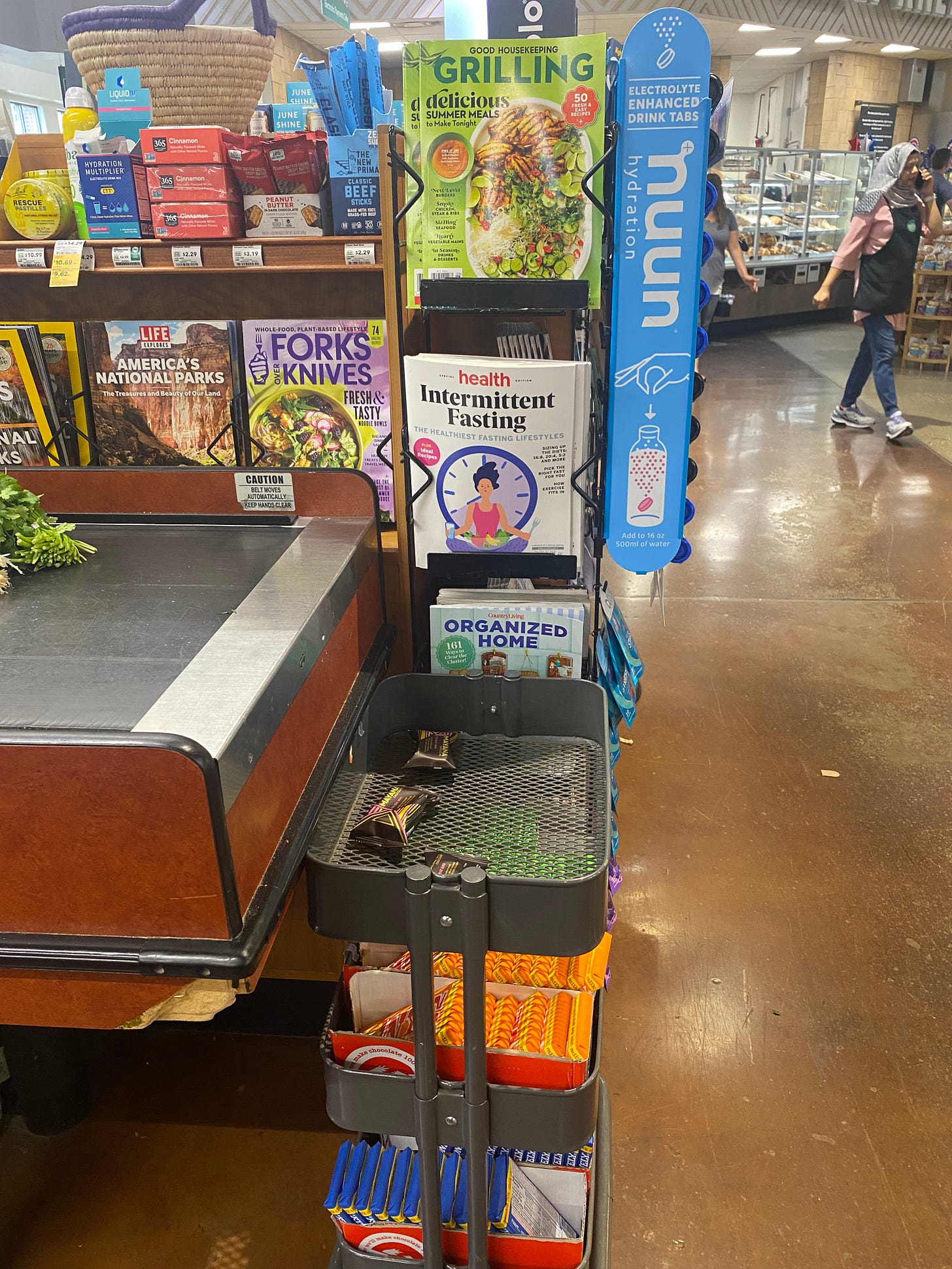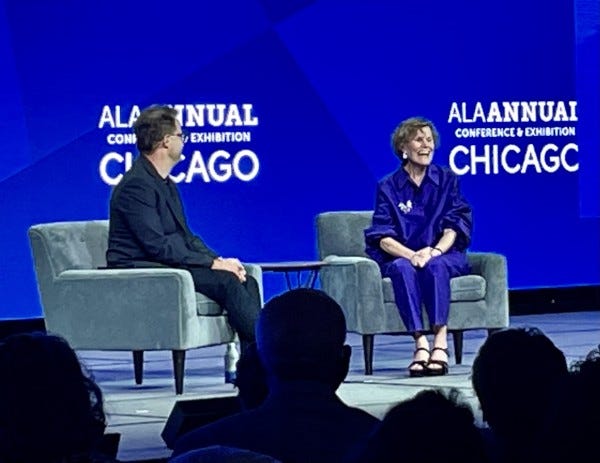Is the future analog?
Nope. But it would be nice if digital was a little less terrible - Issue 101
Last week, The Washington Post ran an article titled “6 analog trends that are good for the soul.” That sounds nice, doesn’t it? Take a little break from the screen. Drop a postcard to a friend. Dust off the turntable and spin some vinyl. Crack a book. Buy a magazine from the newsstand. Sounds refreshing. A break for the eyes. The brain. Or perhaps the soul.
The article starts this way (If you haven’t already clicked on it and dropped down the rabbit hole): “Sometimes it’s better to be inefficient.”
Which begs the question: Are analog items less efficient?
Not necessarily. The author brings up the humble print book. I think reading a print book is pretty darn efficient. After you pay for it, you own it. There is no subscription fee, license fee, it will never run out of electricity and you can read it in bright sunlight, or turn on a nightlight in the dark. Electricity goes out? Light a candle. That’s real old school.
Now, I would stipulate that, yes, the creation and distribution of the humble print book is less efficient than distributing it digitally. You have a publisher, a printer, a wholesaler, a retailer all in the mix. Shipments can spoil. Printers can shutter a plant. Wholesalers and retailers go out of business.
David Sax’s book, “The Future is Analog” is on order. I was impressed by this quote in a preview. And to further his point…I was reading it on my phone while waiting for the umpteenth update to my work computer to finish updating so I could start work:
“On the one hand, we can continue moving forward blindly, following Silicon Valley’s imperative to create a world where digital is the driver and anything analog is simply disrupted out of existence. Or we can pause, absorb the hard-learned lessons of the digital immersion we experienced during the pandemic, and build a future where digital technology actually elevates the most valuable part of the analog world rather than replacing them.”
I had some similar but less eloquent thoughts a few years back when I was still writing on my blog, “From the Foredeck of the Titanic”. The post was titled, “In Praise of Analog”.
It’s something I think of often. My work day is now spent entirely on the internet. If the net goes down, I can’t work. It didn’t use to be that way but it is now. I can’t speak to the issue of employer/employee privacy (I’m self employed), but I do know that the fact that there are literally dozens of companies each day tracking my movements around the internet robotically is creepy.
I’m encouraged to make reservations on line. If I call someone, I’m on hold or talking with robots or dealing with endless decision trees. A TV I bought only three years ago is now considered aging tech and, of course, is breaking down and needs replacing because fixing it is out of the question.
I don’t want to go back to the old analog past. I’d rather not see mullets, shoulder pads and thermal printer fax machines in the wild again. But the point is this and I wish it was something our digital overlords would consider:
Old school analog tech worked for us, the owners of the tech. It was a simple transaction. We paid the manufacturer, they gave us the product. We took it home and used it.
With digital tech, both physical and digital, we pay for the product, and we may have to buy a subscription. Once we use it, we may get followed around to see what we do. It will get updated, sometimes without our permission or knowledge. If it’s physical, we may discover that after a few years, it won’t work anymore and need replacing. An update may be entirely different from what we were using before and we may have to learn a new way to use what we’ve already paid for.
You get the picture.
If the future is going to be a little less terrible, it would be nice if the tech worked for us instead of the other way around.

one___Axel Springer may cut editorial jobs and replacing them with AI
The German tabloid Bild has warned its staff that cost cutting in its editorial department may be made in order to take advantage of “the opportunities of artificial intelligence.” In the meantime, the company also eliminated 200 jobs as a result of the reorganization of their regional newspaper business.
As with so much of this reporting on potential job losses and the impact AI could have on newspapers, magazines and book publishing, the question that keeps coming into my mind is simple: “Who’s overseeing what the AI writes or reports on?” “Can we trust the AI?” “Can we trust the person managing the AI?” “Will this employ people and help the overall economy - or enrich the investors beyond a simple, reasonable return?”
Stay tuned. This will be interesting.
two_Vogue Ukraine keeps publishing in spite of the Russian invasion
Shortly after Russia invaded Ukraine, I found and covered an article that appeared in The Drum about how Marie Claire Ukraine shifted from a fashion publication to a magazine that helped its readers survive an invasion.
Not surprisingly, Vogue Ukraine had a similar experience and in a recent FIPP podcast, Julia Kostetska, the publisher told her story of how she and her staff transitioned from “fashion to fighting.”
This spring, despite the continuation of the war, Vogue Ukraine managed to make it back into print with a special issue entitled, “The Road of Unbreakable”.
Every time I find myself wondering why an initiative didn’t bring the results that were expected, or a newsstand shipment goes astray in a warehouse, or someone calls up and goes on an extended tirade, I just remind myself, “Ukrainians publish magazines in a war zone.”
We’ve got it pretty easy.
three__The right to be forgotten…
The Chicago Sun-Times has a pretty storied history in the world of newspapers. Circulation-wise, it’s long been an also ran to the larger Chicago Tribune. But earlier in this decade, it took an interesting turn from potential bankruptcy from the ownership of an investment group to a non-profit run by NPR affiliate WBEZ.
The latest initiative from the Sun-Times is the “right to be forgotten”. The Sun-Times newsroom will help people who have had arrest records published and expunged, also get them expunged from internet search engines.
Maybe this is a case where the Internet isn’t always forever?
four__Bookforum Magazine gets a new lease on life from The Nation
The celebrated literary magazine was closed in December of last year but it looks like it’s death was only a temporary thing.
The Nation, a political magazine founded in 1865 by abolitionists, concluded talks this spring and will relaunch the magazine this August. Bookforum will remain a quarterly title and will remain editorially independent of The Nation.
In its previous incarnation at Penske Media, Bookforum was a supplement to another magazine, Artforum. Now at The Nation the magazine will need to survive, and thrive, on a mix of subscriptions and advertising revenue. As the president of The Nation, Bhaskar Sunkara said, “It’s somewhat defeatist to just say that these entities can’t be profitable, or that in a country of 330 million people — and in a much bigger language market — you can’t find enough people to sustainably produce a quarterly print magazine.”
five__Judy Blume wants to know what the book banners are afraid of…
I think we know what they’re afraid of…
The legendary YA author spoke at the recent ALA conference here in Chicago.
And here’s a thing I didn’t know about this amazing author: She owns the bookstore, Books and Books, in Florida.
Things Placed in Front of the Magazine Rack…

I hope you enjoyed this newsletter. Please “Like” and subscribe. You’ll get a brand new release in your email in-box every Tuesday (Or sometimes Wednesday, like today, if things get a little hectic around here).
Want to find me on the social sites?
My Instagram link is here.
I’m now hanging out at Post.News and you can find me here on this new app.
Every now and then I get to put on a suit and tie and comb my hair. Here’s my LinkedIn profile if you want to see me looking all professional.
Yep, I’m still on Twitter. You can find me here, but I’m not spending much time there.
That’s all I’ve got for you this week. I hope the air quality in your neck of the woods improves and you can get outside and not smell too much like woodsmoke. If you get a chance, head over to HR where they’ve put in a new “all digital” AI HR “Associate”. I’m sure it will be incredibly helpful.








Good real world read !!!